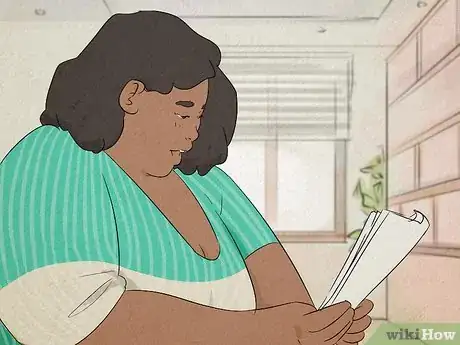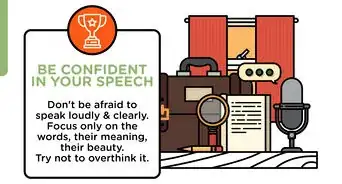This article was co-authored by wikiHow Staff. Our trained team of editors and researchers validate articles for accuracy and comprehensiveness. wikiHow's Content Management Team carefully monitors the work from our editorial staff to ensure that each article is backed by trusted research and meets our high quality standards.
This article has been viewed 10,773 times.
Learn more...
If you’ve ever heard someone like Maya Angelou or Dr. Martin Luther King Jr. speak, you may have noticed how beautiful and lyrical their words sound. That’s because they’re masters of speaking poetically. If you want to speak in a more poetic way, you don’t have to be a famous poet or orator to do it. You can actually work to improve your own speaking so it sounds more poetic. To help you out, we’ve answered a few common questions about how you can do it.
Steps
How can I improve my spoken word poetry?
-
1Choose a topic you feel passionate about. Spoken word poetry is meant to be really emotive and powerful. One way to make your poetry stronger is to focus on things that you personally feel very strongly about. Use topics, events, and stories that you have a strong emotional connection to, which will make your poetry feel more genuine and expressive.[4]
- For instance, if you’re passionate about the environment or equal rights, use them in your poetry!
- You can also choose something from your personal life, such as someone you love or something emotionally powerful that you experienced.
-
2Use repetition and wordplay to create a flow. Poetic devices like rhyme and meter can play a big role in spoken word poetry, but you can really kick yours up to the next level with some high-quality wordplay. Additionally, use repetition to drive home specific points and infuse your poetry with even more emotion. In spoken word poetry, the way the poem sounds is just as important as the words you use.[5]
- Include a clever mix of imagery, emotions, and interesting sounds.
- For instance, you could use rhyme, repetitive sounds, and metaphors and say something like, “I use similar similes as a way to get you to like me.”
-
3Watch other spoken word poets perform. Visit poetry open mics and scheduled events to watch other poets perform their work. Listen to the way they deliver their poems and how they use language, imagery, and wordplay to craft a compelling and engaging piece. Use their work to help inspire and inform your own poetry and performances.[6]
- You can also lookup performances online so you can watch them over and over.
References
- ↑ https://dictionary.cambridge.org/us/dictionary/english/poetically
- ↑ https://introtopoetry2019.pressbooks.com/chapter/chapter-four-poetic-language/
- ↑ https://writersrelief.com/2013/12/04/8-signs-youve-written-good-poem/
- ↑ https://www.masterclass.com/articles/how-to-write-spoken-word-poetry#quiz-0
- ↑ https://www.masterclass.com/articles/how-to-write-spoken-word-poetry#quiz-0
- ↑ https://www.masterclass.com/articles/how-to-write-spoken-word-poetry#quiz-0

































































